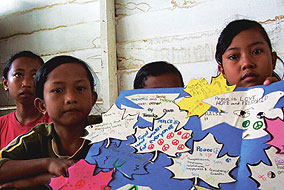
Students in Aceh and messages of peace from their Canadian penpals - photo by Shane Barter UBC Reports | Vol. 52 | No. 1 | Jan. 9, 2006
Tsunami Response One Year Later
Students engaged in range of projects
By Brian Lin
When the devastating tsunami hit Southeast Asia in December 2004, Shane Barter knew from experience that the best thing UBC had to offer was the energy and passion of its students.
Drawing from his extensive experience working with non-government organizations (NGOs) in the region, which includes serving as a long-term election monitor for the Carter Centre, publishing a book on the Aceh conflict, and completing several humanitarian missions, the political science PhD student began organizing UBC student teams to roll up their sleeves and pitch in.
“Basically, I just help out with the language barrier, provide historical and cultural context,” says Barter, 25, “and guide both UBC students and local groups through the process of setting up internships. The students are responsible for coming up with their own projects that use local expertise and lead to capacity building.”
One such group, led by Civil Engineering master’s student Sahar Safaie, is helping provide minor, cost-effective structural modifications to traditional and economy housing to ensure they stand up to future earthquakes (see Engineering Students Compile Seismic Guidelines for Tsunami Reconstruction)
“When I put out a call for action through departmental and student email lists, I expected most of the response to come from social science students,” says Barter. “But it was the engineers who really stepped up to the plate and followed through with their ideas.”
Meanwhile, a student from the Faculty of Education designed an elementary school curriculum called “what does peace look like?” which encouraged Vancouver and Aceh school children, Grades two to four, to communicate through pictures and crafts.
“We asked kids from a Vancouver school to draw pictures of what they think peace is. One kid drew a picture of a cat and a dog sleeping together,” says Barter. “The kids over there sent back crafts and drawings showing where they live.”
“The students here are learning there’s actually real kids involved -- kids that draw in similar styles and about similar themes,” says Barter. “It gives them a personal stake. As they grow up, they’ll probably be more politically and ethically minded.”
For the students in Aceh, Barter says the exchange gives them something relief money can’t buy.
“To actually connect with individual students who are just like them, in another country, is motivating, especially for students who’ve gone through a lot of trauma and have lost a lot.”
Now, on the eve of the first anniversary of the tsunami, a project close to Barter’s heart is finally coming to fruition.
“We’ve applied for a grant from the British Columbia Library Association’s Libraries Across Borders program to build a community library at the Saree School,” says Barter. “This school was started by a friend of mine who died in the tsunami. The grant will allow us to create the physical structure in rural Aceh, fill it with books and a couple of computers, and pay for training through University Syiah Kuala in Banda.”
The library will be open to school children and adults, as well as serve as a resource for NGOs. “We’ve arranged for at least 30 per cent of the books to be donated by local publishers. Local volunteers are recruited to run the place, and village elders will teach kids. There’ll also be a small bookstore and Internet café to help generate some revenue so that it’s sustainable in the long run,” says Barter.
Barter credits UBC’s Go Global student exchange program and the Global Service Committee -- an inter-departmental committee struck to co-ordinate UBC’s commitments to global citizenship, namely in response to natural disasters and development -- for their institutional support to these and other ad hoc projects that may spell the beginning of long-term collaborations in the region.
“There’s a huge demand from the students at UBC to take part in global citizenship, but not many know how to go about it,” says Barter, who would like to see better integration of community service learning into the curriculum and more faculty involvement in global service activities.
“UBC is going in the right direction,” says Barter. “The Global Service Committee is even considering how to incorporate global service commitments among faculty members into tenure review. But there’s more work to be done to capitalize on the energy the students have and their desire to do this.”
The benefits to students are enormous, says Barter. “My experience in the field has been extremely valuable in writing my MA -- and now my PhD -- thesis, and in the amount of credibility I have speaking at conferences around the world. It’s a lot of the grass roots stuff that you don’t get from the Ivory Tower.” Such experiences are invaluable for young academics, Barter adds. “It matures them, lets them engage with other students, and interact with the literatures.”
For additional information on UBC's response to the tsunami disaster and ways you can help, please visit www.ubc.ca/tsunami.
|
